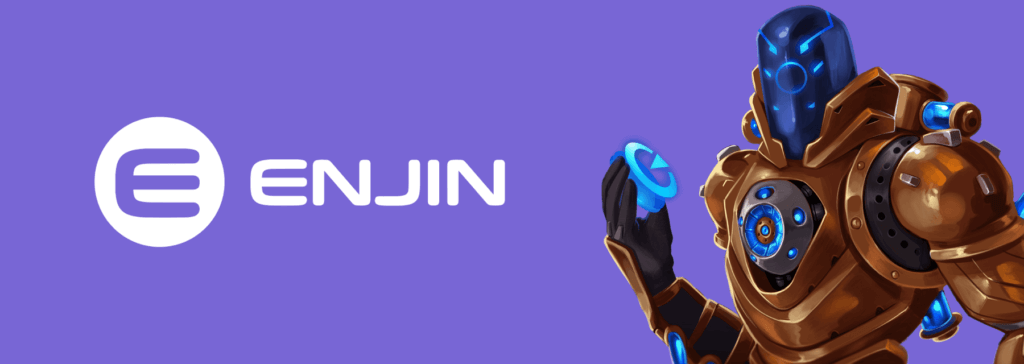ENJIN (ENJ)
Enables users to manage and store virtual goods for games.Enjin allows developers to create and manage virtual goods on the Ethereum blockchain.

Background Behind Enjin (ENJ)
Enjin was created by co-founders Maxim Blagov and Witek Radomski in 2009 and was built as an association gaming platform.
In 2017, Enjin established an initial coin offering (ICO), raising about $18.9 million by selling ENJ tokens to build its new blockchain. Enjin went live in 2018.
In 2020 Non-fungible tokens saw a massive rise in popularity, both with investors and the general public. Enjin seeks to be an industry leader in the Non-fungible token space.
Enjin (ENJ) Basics
The proposal is that by using blockchain technology to operate in-game items across many different properties, Enjin can help reduce the high fees and fraud that have plagued the transfer of virtual in-game goods and collectables.
Toward that goal, Enjin has released software development kits (SDKs) allowing users to both create digital assets on Ethereum and integrate them into games and apps.
Each minted asset is customizable to fit the desired platform and recorded in a smart contract, giving the items the advantages of cryptocurrency, namely speed, cost and security.
Central to managing the digital assets on its platform is ENJ, Enjin’s cryptocurrency, and each in-game item created on Enjin is assigned a value in ENJ.
If you wish to keep up with the design, Enjin keeps users updated on the status of its roadmap through its official website and blog.
Ethereum Blockchain
Enjin is a platform that enables game developers to generate in-game items using the Ethereum blockchain, making it easier to build games.
Enjin (ENJ) Staking
The staking Enjin Coin is pretty effortless and uncomplicated. All you need to do is hold your ENJ tokens in a compatible wallet, and then you will start receiving rewards for helping to secure the network. The more ENJ tokens you hold, the higher your rewards will be.
Enjin (ENJ) Mining
ENJ enables developers to mint items for gaming environments on the Enjin platform.
In order to mint virtual goods, developers have to lock ENJ into a smart contract, thus assigning a value to the item. When a player acquires these items, they can either use them in games, trade them to others or sell them for ENJ, in accordance with the original minting cost.
Enjin (ENJ) Transaction Fees & Speed
Many blockchain games have to use their own network because transaction fees on Ethereum are incredibly high. Most projects would like to use Ethereum because it’s the most popular usable network and is very secure.
Enjin helps games integrate into Ethereum with significantly lower fees, the platform has developed many software development kits that allow users to easily build items and incorporate them into games or applications.
Enjin retains the outstanding features of the Ethereum network such as quick transactions speed and advanced smart contracts, due to its design following the erc20 standards.
Enjin (ENJ) Supply
Adding to its value is that like many other cryptocurrencies, the supply of ENJ is limited, meaning only 1 billion ENJ will ever be created.
Enjin (ENJ) Security and Safety
The app uses a characteristic built keyboard with anti-keylogging protections, and utilises advanced hardware encryption when supported.
Enjin (ENJ) Volatility
Enjin’s volatility, its live price can change by a large amount in a very short space of time. The market cap of Enjin is equal to the price of ENJ.
Review and Final Thoughts on Enjin (ENJ)
Enjin has been in the market since 2009, and it concocts its system for gamers with a large number of revisions. Enjin has equally great platform gamers as WordPress is for bloggers, and Shopify is for retailers. It’s an immense biological system that lets you handcraft a gamer discussion with help for modern commercial centres, talk, web-based business, and that’s only the tip of the iceberg.

